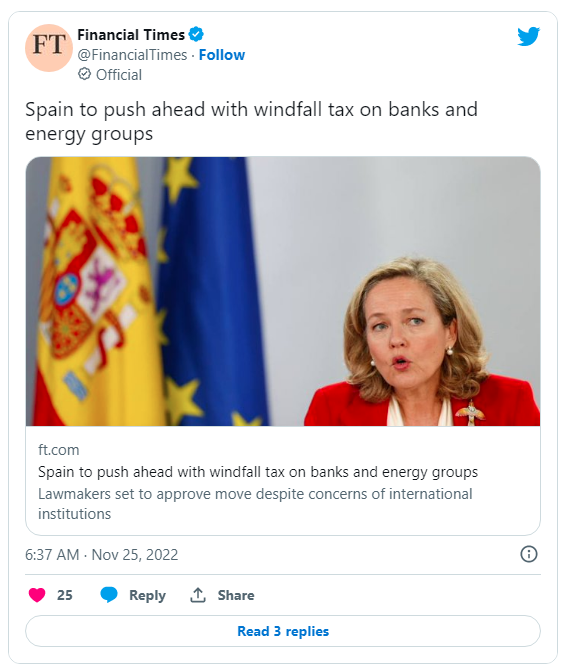
By Lisa Marriott*
Record profits reported by banks, fuel retailers, energy companies and other businesses at a time many New Zealanders are struggling to make ends meet have seen people asking whether it’s time to introduce a “windfall tax” – to be triggered whenever an industry has made “too much profit”.
But what is a windfall tax? How much is “too much profit”? And do windfall taxes actually work? History, it turns out, can tell us a little about taxing a windfall.
A windfall is simply a large amount of money that is received unexpectedly. A windfall tax is a targeted tax on unexpected gains that result from market circumstances rather than any action taken by a firm or industry. It’s not a tax on profits resulting from innovation, entrepreneurship or insightful business decisions.
An element of windfall exists in the banks’ overestimation of COVID-related losses that didn’t eventuate, under investment in generating capacity in the electricity industry, and Russia’s invasion of Ukraine causing oil shortages.
Theoretically, a windfall profit is more than what is normally required to reward shareholders for their investment, and more than what a company would need to be encouraged to invest in technology and innovation.
Windfall taxes are on “excess profits”. They’re also not something that can be predicted and therefore incorporated in regulation.

How much is too much profit?
Recent reports of exceptionally high corporate profits have been met with accusations of profiteering at the expense of consumers.
Among the more egregious examples are the profits of oil giants BP and Shell, which reported global profits of £7.1 billion (NZ$13.7 billion) and £8.2 billion (NZ$15.8 billion) respectively in the three months to September.
Higher profits generally result in larger dividends to shareholders. While some may argue that is the shareholders’ reward for their investment risk, the result is still some transfer of wealth from those who have the least (poorer consumers) to those who have more (shareholders).
It could be argued that where there is negative social impact from excess profits – people unable to use their car because the price of fuel is too high, for example – that some intervention is acceptable.
The history of windfall taxes
Windfall taxes have a long history. A version was applied to UK munitions manufacturers who made large profits from the first world war. New Zealand also introduced an “excess profits duty” in 1916 to help fund the cost of the war.
More recently, an excess profits tax was imposed on banks in the UK in 1981, when the banks were benefiting from high interest rates. And in the US in the 1980s, the federal government imposed windfall taxes on oil companies as price controls were phased out.
Again in the UK, in 1997 a windfall tax was imposed on privatised utility companies. One of the factors driving this was a view that the companies were under-regulated during their initial years in the private sector (note the similar claim made recently about New Zealand’s electricity sector). The government argued efficient regulation would support competition that would minimise the opportunity for excess profits.
A more recent example can be seen in the UK with the introduction of a “temporary, targeted energy profits levy” – essentially a windfall tax – in May this year.

Do they work?
One aim of a windfall tax is to discourage firms from overcharging customers. However, where a firm has significant market power, they may be able to pass the tax on to customers.
There is also the potential the tax could result in reduced investment, which is why the UK tax announced this year has the accompanying tax relief for new investment.
One benefit of a windfall tax is increased government revenue. Earlier windfall taxes intended to raise money for war efforts achieved their objectives. But larger companies became skilled at avoiding them over time.
More recent windfall taxes have not been as successful as anticipated. The US tax on oil in the 1980s is often given as an example of unintended consequences: there was reduced domestic oil production and increased reliance on overseas oil. However, at least some of the failure can be attributed to poor tax design.
A windfall tax is more likely to be successful if it is actually taxing a windfall. But this is not a tax that would be simple to implement. Determining the excess profit is likely to be complex. A time frame for the tax would also need to be determined – a windfall tax should not be permanent.
Finally, there is a general reluctance in New Zealand to use the tax system in an ad hoc way. There is a specific process intended to ensure effective tax policy development. Even if the usual consultation process is bypassed, change is unlikely to be fast.
Are there alternatives?
Another option to minimise excess profits is to introduce a price cap, which sets a maximum price that can be charged for a product or service.
Recently, 15 member states asked the European Union to impose a cap on gas bills to slow rapidly increasing prices. But price caps are infrequently used, as they distort price signals that help determine supply and demand – a crucial component of a well-functioning market.
In the end, windfall taxes can be beneficial. But they are contentious due to the different priorities of shareholders, companies and consumers.
If we’re concerned about inequality and further transfers of wealth away from those who have the least, however, windfall taxes are – at a minimum – worthy of greater consideration.![]()
Lisa Marriott, Professor of Taxation, Te Herenga Waka — Victoria University of Wellington
This article is republished from The Conversation under a Creative Commons license. Read the original article.
53 Comments
Of course there should be a Windfall Tax, but only on the basis that any company losses should also attract a equivalent tax payment in cash.
I think this is called carrying forward losses
no it is not .. all losses are carried forward at a "normal" rate , not on some "special , one-off / temporary rate" created in response to them being unusually high.
If the government introduces windfall taxes when corporates do well, does that set the obligation for the government to bail out corporates when they are struggling/failing??
well so far we have seen plenty of the bail outs, but not much windfall taxes.
Which is what they do anyway right? <cough cough> SCF <cough cough ahem>
.... "Determining the excess profit is likely to be complex".... Nice exercise for tax consultants and University professors. Would prefer to see some substance rather than a long article trying to justify the need for a windfall tax and showing precedents.
UK ..... "and the money was used to fund a programme to help people off welfare and into work" ........
Another Labour (UK or NZ) slush fund which would fund more bureaucrats than getting people into work.
Bureaucrats are workers too! They pay their taxes! /s.
After a point, bureaucrats become a parasite on the productive economy. At that point we have low unemployment, excess demand and a fall off in services along with more borrowing to fund the bureaucrats.
We live in a country where we are going to stop exploiting the environment (valid goal), yet at the same time expect to maintain our first world status. I.e. we don't mine our coal, therefore we don't earn taxes provide jobs etc, we buy it from Indonesia, we shift our dirty problem and at the same time reduce the economy, yet do we reduce bureaucrats?
The shrinking of the economy is felt by the citizens not the bureaucrats.
a windfall tax should apply to profits aleady announced, that would stop creative accounting.
Jeepers, socialism/ communism anyone? robin hood tax policy?
Record profits by banks, fuel retailers, energy companies and other businesses, I think if you dig deeper you'll find some fallacies here...
banks profits have been driven by expected OCR rate increases to fight inflation and front running rate increases increasing the spread, this is a direct result of the RBNZ's actions, now and in the past... this gap will close as mortgages roll over and the interest rate spread narrows...opportunistic? yes.. but a short-med term issue
fuel retailers - this is driven by international oil price surges as a direct result of war and covid supply chain issues, yet nearly 50% of the cost is simply tax that goes to our govt! - does that mean windfall taxes on taxes?
energy companies - not clear on drivers there... I've heard noise on Tiwai, but otherwise unclear
other businesses... ??
Transport and shipping was due to diesel cost increases and covid which jammed ports and drove shipping lines to redirect resources to the most profitable lines ignoring others like NZ, leaving expensive airfreight as the only option - This situation is still high, but pressures are easing with rates falling back...this impacts most imported product into NZ
Where is the windfall back to taxpayers for the inflation component of earnings taxed as real income?
This year's large growth in energy company profits was primarily due to Genesis valuing their derivatives (big loss last year, big gain this year - neither are cash items), Meridian selling their Australian assets and banking the profits, and Mercury buying Transpower's customers (bringing them into the fold of the 'big 4' companies that people are generally looking at). Meanwhile all the Gentailers are going all-out to build new green generation, and and windfall tax will discourage that.
The story disappears if you look closely.
Just bring in the land tax. Anything else is a waste of millions with consultants, and then professional fees managing avoidance. Land tax, simple, and impossible to avoid.
... yes , untaxed capital gains on land is the windfall IRD ought to be able to tap into ...
Why this ongoing obsession with taxing & double taxing productive successful businesses ...
... land is the veritable treasure trove ....
More important to tax the economic rent than the capital gains.
An annual LVT captures extra tax if the land rises in value ... but , you're right , it is levied on the total value of the land ...
... there was an estimate that land owners bordering Trasmission Gully gained a $ 8 billion tax free capital increase in their land values when the motorway was completed ... tax free ... lucky , huh !
The landscape is dotted with standalone houses sitting on large pieces of land less than a mile out of Wellington CBD. Taxing such land in major cities appropriately should release more of it for housing intensification, and should be highly effective in making housing affordable in cities and improving overall economic productivity.
This alongside the densification plan could be a one-in-a-lifetime opportunity to de-Americanise our urban centres and save billions of taxpayer dollars each year on building and maintaining expensive road and rail networks.
Those houses that are in areas with gold plated public transport services and in areas with good schools.
The irony being the occupier has probably lived there for 50 years, has little use for the public transport except for the odd trip to New World on the Gold Card and kids are long gone so no need for the schools. In fact, they'd probably lobby for the schools to be relocated due to the unbearable noise twice a day from those rotten ill-mannered school kids.
Um, isn't that what rates are? Land tax....?? i mean I've owned sections and houses and rate bills are mandatory
Yeah but rates are a multitude of taxes bundled into one payment. A "land tax" would just be an additional line in your rates statement with the money going into the Government Consolidated Fund or some special Land Tax Fund.
Rates come generally on the proviso of services to that land (water/roading etc). A blanket land tax would be in addition.
There is no government funding mechanism in taxation as it only deletes money. Beardsley Ruml who was a chairman of the New York Fed and had this to say,
"since the end of the gold standard, "Taxes for Revenue are Obsolete". The real purposes of taxes, he asserted, were: to "stabilize the purchasing power of the dollar", to "express public policy in the distribution of wealth and of income", "in subsidizing or in penalizing various industries and economic groups" and to "isolate and assess directly the costs of certain national benefits, such as highways and social security".
Can you believe that we have commenters posting here who actually want more taxes and even suggesting how to get more! We need less tax, and even more less tax offset by tougher budgeting by the Government and Council slush fund feeders. I am appalled by these Champagne Socialist who believe finding more ways to tax is the answer. It is not.
... it's not a matter of wanting more tax , but of shifting the balance ... the burden of tax falls heavily on wages earners & business , the productive sector ....
If we can capture some tax off land , that can be offset to offer PAYE tax relief & a cut for business too ... redress the balance ...
Holy moly , I almost agree with you , but it leaves share value increase etc untaxed.
Why tax land? Somebody may own it but it produces no income if it’s residential. Why should somebody pay a tax on any increase in the value of land, just because someone else has created higher value somewhere else? Why should a long term land owner be punished because some stranger has offered to pay more for a piece of land down the road or across the city?
In the case of the landowners benefitting from Transmission Gully, why is it reasonable to tax the poor buggers who actually get out of bed in the morning to go and build the thing, while those who are rewarded with large capital gains don't pay a penny? We're taxing the productive population and ignoring those simply accruing gains with no effort.
Maybe if we didn't spend decades trying to avoid building critical infrastructure then taxing people when we finally pull finger for the uplift wouldn't seem so on the nose.
Maybe we should be issuing rebates to long-suffering taxpayers doing without the vital infrastructure for so long in the first place.
Those "long-suffering" taxpayers shouldn't be choosing to live or work in places that aren't supported by yet to be built "vital infrastructure".
If they had moved somewhere on the basis that Transmission Gully existed, but the Government then decided to close it off for no good reason, maybe the idea of a rebate would hold a small amount of water.
Those "long-suffering" taxpayers shouldn't be choosing to live or work in places that aren't supported by yet to be built "vital infrastructure".
The entire city of Auckland would like an extremely curt word with you. You live where you can afford to live.
People seem very keen to project the illusion of choice when it comes to an excuse to increase taxation.
Why should a long term shareholder be punished because some stranger has offered to pay less for a piece of the company they own?
That's they way things are valued in an open capitalist market economy.
The government can only tax back what it has first spent and if it is running deficits then it is always putting in more money that it is taxing back out again.
How about a progressive tax regime for business tax? 28 cents under a million , 33 cents above , 36 cents above 10 million , 39 cents above 100 million.
Singapore's corporate tax rate is 15%, a country with no natural resources except its location on a trade intersect & the smarts & work ethic of the people, a multiracial population the size of NZ in an area the size of greater Auckland
60 years ago it was a mangrove swamp. Now it has the 4th highest GDP pc in the world (NZ 32nd) How about that.
More to do with its port and airport than its tax rate, I think.
Check out the number of large multinationals with their Asia/Oceania regional tax domicile now registered there & their transfer pricing arrangements & profit shifting structures.
I used to work for one. They're also found in eg Switzerland and Luxembourg for the same reasons.
Suggesting turning NZ into another tax haven country is a race to the bottom... Singapore is simply blessed with a fantastic position, but it's decent government under various Lee benevolent dictatorships certainly haven't hurt it.
"Race to the bottom..." Really ?
How about personal tax ?
"Resident individuals are entitled to certain personal allowances and are subject to graduated tax rates ranging from 0% to 22% (24% from year of assessment 2024). Non-resident individuals are not entitled to any personal allowances and are subject to tax at a flat rate of 22% (24% from year of assessment 2024)"
https://www.iras.gov.sg/taxes/individual-income-tax/basics-of-individua…
Dont get me started on their healthcare, education & crime performance vs NZ
Windfall tax on lotto winnings?
Sure!
This greedy government loves the current inflation, more tax take to pay back the mountain of debt they have built up. Prices go up, wages go up, yet tax brackets don't.
The government could repay its borrowings at any time just as it did when the Reserve Bank undertook QE. The issuing of debt has nothing to do with financing spending, this is just another fallacy of orthodox economics. If the government left the currency that it creates as bank reserves rather than as bonds then the RB wouldn't be able to maintain the OCR and the interest rate would fall to zero.
Standard and Poor's explains here,
https://www.hks.harvard.edu/sites/default/files/centers/mrcbg/programs/…
Some could argue that inflation is simply the governments way to pay for excessive spending in the last 4-5 years.... running super hot printing presses have a price that other people have to pay (i.e. we/ us)... hence this is where we are
Devaluing the currency and increasing living costs is far easier than actually restraining spending and making some hard choices to create value rather than stifling it...
Labour should be cooked for the next election but if the voting majority is anything like the socialist robin hoods in NZ who actually aren't interested in adding value to other human beings and being ok with that - then Labour will likely get yet another opportunity to cause more damage to most NZer's wellbeing...
I think most social metrics are terrible in terms of Labours policy performance in the last few years, and heaven forbid you need emergency health treatment in most hospitals!! the poor staff there are wonderful, but they are very stretched and queues literally take 5-10hrs (first hand experience) to see a doctor... it's bad...
At least we will be able to empathise with our team of 5 million!
if you study sectoral balances then you will see that government budget surpluses are very damaging to the private sector and households as they must increase private debt and destroy savings, even more so when NZ is also running large current account deficits. Banks create the vast majority of our money through their lending anyway.
Some explanation of sectoral balances here. https://gimms.org.uk/fact-sheets/sectoral-balances/
There is nothing really wrong with creating money as there is value destruction through consumption regardless of balancing the books
Infrastructure is necessary, and supports long term growth, but the $60 BILLION (that's $60,000,000,000) spending in the last 4 years has been largely unproductive
I think the elephant in the room is simply blowing out a national debt from $60billion to ~$130billion (+115%) in 4 years with another $30billion in the next year which will be +167% in national debt in 5 years, hence inflation...
Like I said above, printing presses have a price that other people pay (meaning us...) and if its for wasteful spending then long term it becomes a drain on the economy
We blew out National debt from $10b to $60b in 2009 - 2013 (+600%). That was +$50b. So another +$60b is that really a bad thing?
With inflation comes pay rises.
Median hourly earnings from wages and salaries rose by 6.8 percent (up $1.90) to $29.66 per hour in the year to the June 2022 quarter. This was the largest annual percent change in median hourly earnings since the series began in 1998
https://www.stats.govt.nz/news/weekly-earnings-rise-as-more-in-full-tim…
Banks have created somewhere between $500 billion to $600 billion though through their lending and what is the result of this other than record house prices and unaffordable rents. Government debt is not debt in the normal sense and it is private debt levels which eventually damage economies when it becomes unsustainable as in 2008. Why does the Reserve Bank adjust interest rates except to control the amount of money created by the banks.
enjoy your comments treadlightly!
I try to offer a different perspective on economics other than from the mainstream. We do need to hear a greater variety of ideas and which we don't get from our media.
Purely as a side note, given we live in Catalunya, Spain, local train has been heavily subsidised. For 10 Euros I am able to travel 6 zones (approximately the distance between say Waikanae and Wellington) as frequently as I like from September 2022 until March 2023. It may even be extended further I'm unsure of the impact this is having on car volumes but so believe it's such a great initiative! The trains are being used to capacity. My coworking space is a quick 9 minutes train ride from my village, with trains leaving very frequently.
I'd be curious to see how this initiative balances the free transport expense versus the annualised decrease in gas imports for the Kingdom of Spain? Also a fabulous way to incentivise the population out of cars!
We hear about the windfall tax. Love to see how successful they are in extracting cash. Popcorn and beers in every country these days fallow Kiwis :)
NZ does have its its own sovereign currency and autonomous central bank unlike Spain. The Euro currency is a disaster that is just waiting to fail with the ECB having to finance its members budget deficits.
Good point TL. Additionally, such marked differences in economic strengths / weakness between Sth and Nth Europe. Fascinating interplay between the various European countries.

We welcome your comments below. If you are not already registered, please register to comment
Remember we welcome robust, respectful and insightful debate. We don't welcome abusive or defamatory comments and will de-register those repeatedly making such comments. Our current comment policy is here.